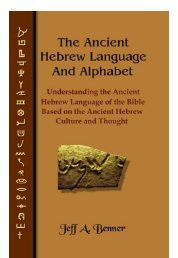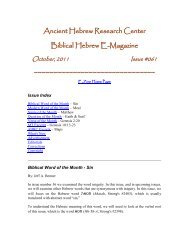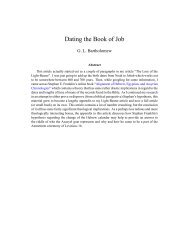My Name Forever - Ancient Hebrew Research Center
My Name Forever - Ancient Hebrew Research Center
My Name Forever - Ancient Hebrew Research Center
You also want an ePaper? Increase the reach of your titles
YUMPU automatically turns print PDFs into web optimized ePapers that Google loves.
<strong>My</strong> <strong>Name</strong> <strong>Forever</strong> 17<br />
Ecc. 11:3<br />
tU vh o J<br />
sham y’hú(t)<br />
y’hú(t)<br />
tU vh<br />
Michaiah<br />
Uvhfh n<br />
MikháY’hu<br />
# y’hú<br />
U vh # Y’hú(v)<br />
vU vh ´ Y’hú<br />
U vh ´ Y’hu<br />
Uvh<br />
55. This leads us to understand the pointing Y’hó I vh and Yáhu Uvh within other men’s names as<br />
modifications. In both cases the unaccented syllables are the authentic ones. Both unaccented syllables<br />
are found together in the unaccented Y’hu Uvh at the end of MikháY’hu Uvhfh n (Michaiah). The <strong>Name</strong>,<br />
therefore, is not a “full form imperfect” like Yih’veh (Yih’weh) vu vh or Yeheveh (Yeheweh) vuvh. If it<br />
were, what need would the scribes have had to change the pronunciation of the “shortened” imperfect<br />
Y’hú U vh to Y’hó I vh and Yáhu Uvh in the majority of proper names? If his <strong>Name</strong> was Yih’veh (Yih’weh)<br />
vu vh or Yeheveh (Yeheweh) vuvh the shortened form Y’hú U vh would have been all the change necessary<br />
to keep it from being spoken in keeping with Rabbinical tradition. And yet it is readily apparent that the<br />
“shortened” form has been altered. That speaks volumes in and of itself.<br />
56. But it does not tell us why the name “Michaiah” is not pointed consistently. Why the<br />
ambivalence? Why is it written now as MíkhaYáhu Uvhfh n, and now as MikháY’hu Uvhfh n? Could it be<br />
that the scribes who pointed the text, in those places where it reflects the actual verbal form, wanted to be<br />
sure that his <strong>Name</strong> indeed endured “forever,” to “all generations,” at least in a few places? Could it be<br />
that the name Michaiah was chosen to carry this honored distinction because his name means, “Who Is<br />
Like vU vh?” Regardless of exactly why, when all the witnesses have been questioned, there it is, the<br />
<strong>Name</strong> above all names. It is available to seekers of every generation, embedded in the name MikháY’hu<br />
Uvhfh n and in the text of Ecc. 11:3.<br />
57. I would like to know why this phenomenon has not been entered into the equation. Why has this<br />
information not made it into any discussions about his <strong>Name</strong>? Is it not applicable? Is it not pertinent? If<br />
not, why?<br />
58. I have one further observation to make. In each instance where the <strong>Name</strong> is represented as Y’hó<br />
I vh, it is at the beginning of the man’s name. The authentic, unaccented Y’- -h is the first syllable. In each<br />
instance where the <strong>Name</strong> is represented as Yáhu Uvh, it is at the end of the man's name. The authentic,<br />
unaccented -hu Uv- is the last syllable. Perhaps it contains a riddle?<br />
vU vh is the beginning and the end, the first and the last.






